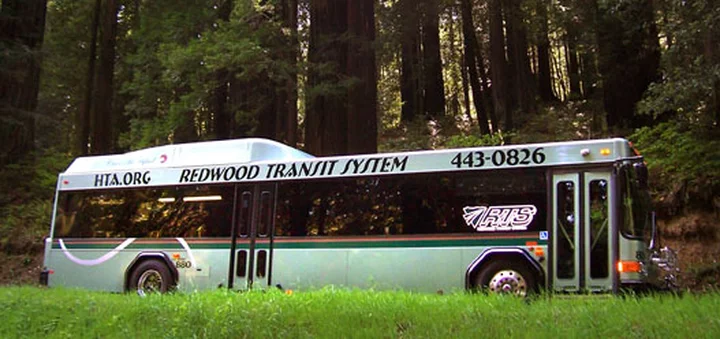File photo via Redwood Transit Authority.
Below is a statement signed by several local environmental organizations about the a proposed sales tax to support road repair, which could appear on the November ballot:
We are caught in a dilemma. Humboldt County owns and is responsible for maintaining 1,200 miles of roads. Most of these road miles are rural, providing access to a small number of residences and businesses. Taxes associated with these rural properties are not sufficient to pay to maintain the roads that reach them. Gas taxes are not enough, either. Thus, we have found ourselves a trap: We have too many roads and not enough revenue to maintain them.
The County’s solution has long been to subsidize roads using other sources of revenue, including a state funding program that should go to meeting our local unmet public transit needs — of which there are many. But none of these subsidies have been enough. Now the County is preparing another new sales tax to put toward ever-increasing road costs. You may have already received mailers from the County about this tax measure, covered with pictures of roads and natural disasters. As environmental leaders, we harbor concerns that without major changes, the new tax would be regressive and harmful to meaningful climate action.
For environmental voters, the tax measure looks like a plan to maintain an environmentally damaging status quo. Transportation is the largest emitter of greenhouse gas emissions in Humboldt County. As the draft Climate Action Plan acknowledges, reducing greenhouse gas emissions from transportation requires investing in a more balanced transportation system, and particularly increasing the use of public transit. Part of the difficulty in convincing people to take the bus is that we do not finance our transit system adequately, resulting in long wait times and poor service on the weekends and holidays. As stated earlier, the County already siphons away money from public transit to rural roads.
And despite Humboldt County’s auto-oriented transportation system, many local people don’t or can’t drive and rely on public transit instead. Many kids use public buses to get to school, seniors use transit to get to the grocery store and doctor’s appointments, and people with disabilities use transit to get to jobs and services. At least 15,000 adults in Humboldt County don’t have a driver’s license at all, and many lower-income community members lack reliable vehicle access and rely on transit for most of their transportation needs. But sales taxes hit these same low-income people the hardest. It strikes us as fundamentally unfair to ask our lower-income friends and neighbors to bear the burden of subsidizing a road system they don’t even use, primarily for the benefit of better-off residents, without getting something in return.
In short, a new sales tax that only funds roads would be both deeply inequitable and environmentally irresponsible. That’s why Humboldt’s environmental leaders will oppose the County’s tax measure unless a substantial amount of the revenue goes to support public transit.
And the County does need a substantial amount of dedicated local transit funding: we cannot be satisfied with whatever pennies may be left over after road projects are funded. For example, to serve more bus commuters–and to give existing riders the service they deserve–we need buses every 15 minutes at all stops between McKinleyville and Fortuna. That requires a commitment to meaningful local transit investment. For any tax measure to gain support from environmental voters, we insist on holistic transportation funding that meets the needs of both roads and transit.
Colin Fiske
Coalition for Responsible Transportation Priorities (CRTP)Tom Wheeler
Environmental Protection Information Center (EPIC)Melodie Meyer
Redwood Coalition for Climate and Environmental Responsibility (RCCER)Caroline Griffith
Northcoast Environmental CenterDan Chandler
350 Humboldt

CLICK TO MANAGE